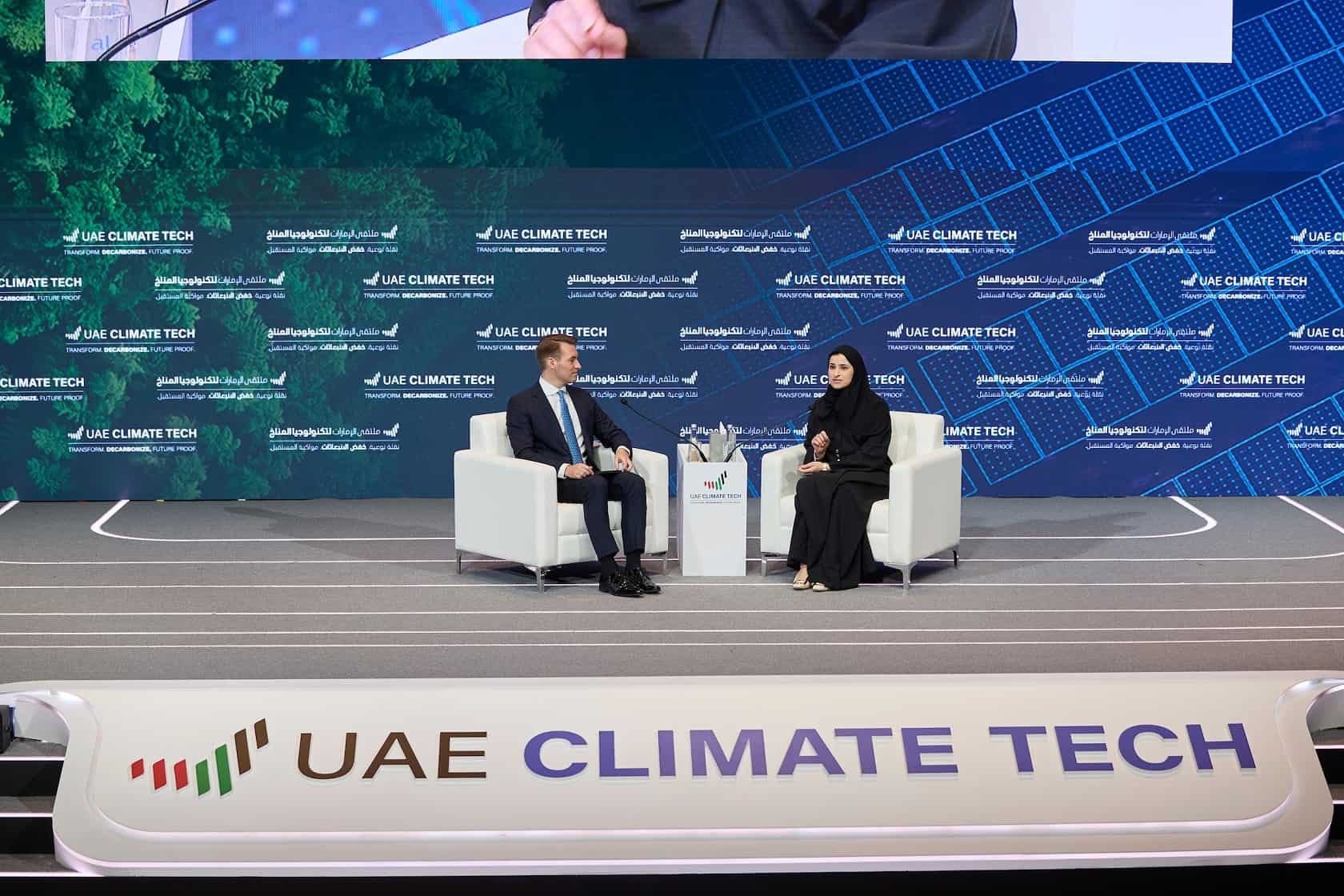Abu Dhabi, UAE — Technology is vital to accelerating industrial decarbonization and supporting net zero by 2050 targets, Sarah Al Amiri, Minister of State for Public Education and Advanced Technology, told the UAE Climate Tech forum.
During a fireside chat titled ‘Technologies and Policies to Decarbonize Global Industry: A UAE Perspective’, she said: “The decarbonization of the industrial sector is imperative to ensuring the success of global climate action efforts. In the UAE, we are spearheading a pragmatic, realistic and practical approach to decarbonization rooted in partnerships and bringing together all segments of society.
“There are three main pillars to this approach: transforming existing industries with advanced technologies, creating the green industries of the future, and decarbonizing hard-to-abate industries. We believe that with the right enablers: policy, technology, access to finance and partnerships, we can achieve climate targets.”
Transforming existing industries
Al Amiri said: “Technology and innovation play a key role in making existing industries more sustainable. Digitalization can significantly boost productivity and improve efficiency through technologies such as artificial intelligence, IoT, robotics, and blockchain, driving low-carbon production and decarbonization throughout value chains.
Today at the #UAEClimateTech forum, I spoke about the critical role of integrating technology across the entire value chain of production to accelerate decarbonization and achieve our Net Zero targets. pic.twitter.com/QGDqGUWXH7
— Sarah Al Amiri (@SarahAmiri1) May 11, 2023
“The Ministry of Industry and Advanced Technology launched the Technology Transformation Program (TTP) to drive the technological transformation of the industrial sector. The Industrial Technology Transformation Index (ITTI) was also created to encourage companies to pursue digital transformation and drive demand for green solutions by coupling it with our in-country value program and financing solutions.”
Enabling green industries of the future
Al Amiri said: “We must support research and development as it plays a crucial role in advancing technologies that underpin the green industries of the future. The UAE has taken important steps towards developing climate technologies. For instance, we formed the Emirates Research and Development Council, and we aim to boost R&D spend to 2 percent of GDP by 2031 to further develop and deploy green innovations in the UAE and around the world. The increase in R&D spend provides a technology push mechanism to fast-track green innovation and market commercialization. Furthermore, the UAE is also working on green policies, regulations and standards that provide a market pull mechanism and drive demand for green solutions.”
She noted that the UAE is investing heavily in key enabling technologies including hydrogen, CCUS, desalination, digital technologies, and smart mobility solutions, and is simultaneously driving the development of the markets and ecosystems that can sustain and scale these technologies.
Decarbonizing hard-to-abate industries
Al Amiri continued: “The UAE is driving decarbonization in industries that are emission-intensive, such as steel, cement, and petrochemical. While it’s tempting to write these sectors off as unfeasible to decarbonize, we believe that we can decarbonize and we actually must in order to reach our net zero targets. Our focus is on developing and deploying the right technologies such as carbon capture, storage technologies, hydrogen, and low carbon alternatives. With the right investments, technology, and policy instruments we can decarbonize and future proof the hard to abate industries which are critical to the modern society.”
Transforming challenges into opportunities
Al Amiri concluded: “At a time when many societies and countries are struggling with conflicting priorities and experiencing the economic impact of the energy transition, the UAE is turning challenges into opportunities. We are making a big bet on advanced technologies to bolster decarbonization efforts in line with our sustainable economic development and climate targets.”
Al Amiri called on the international community to leverage the right policy instruments to enable the development and transfer of technologies to tackle climate change, as well as making financing available, affordable and accessible.
UAE Climate Tech, hosted by the Ministry of Industry and Advanced Technology in partnership with ADNOC and Masdar, saw the participation of more than 1,000 industry leaders and innovators, as well as experts and investors.
An exhibition and a series of sessions showcased an array of technologies in fields such as carbon capture, AI, robotics, digitalization, hydrogen, renewables and low-carbon solutions for oil and gas and hard-to-abate sectors.








